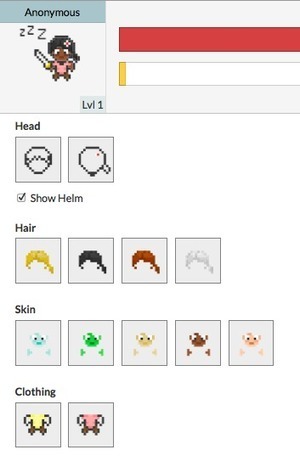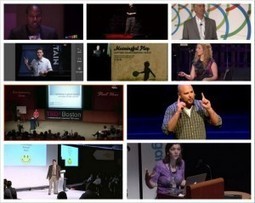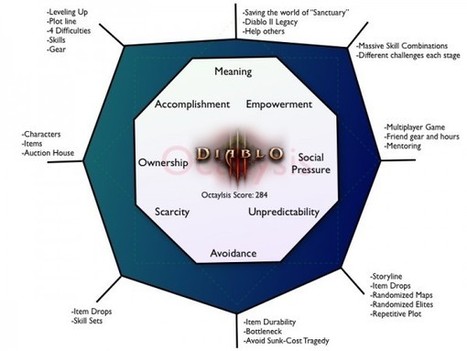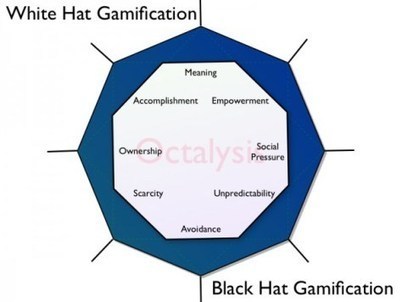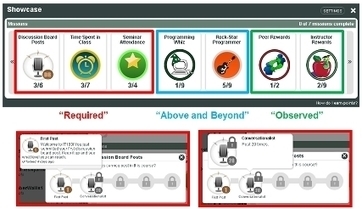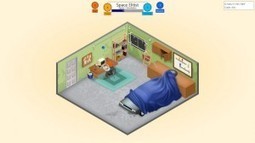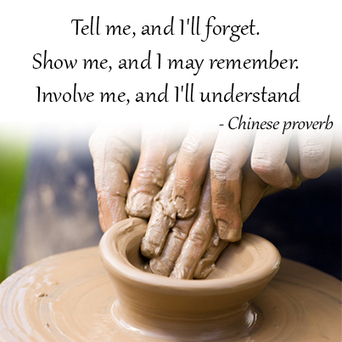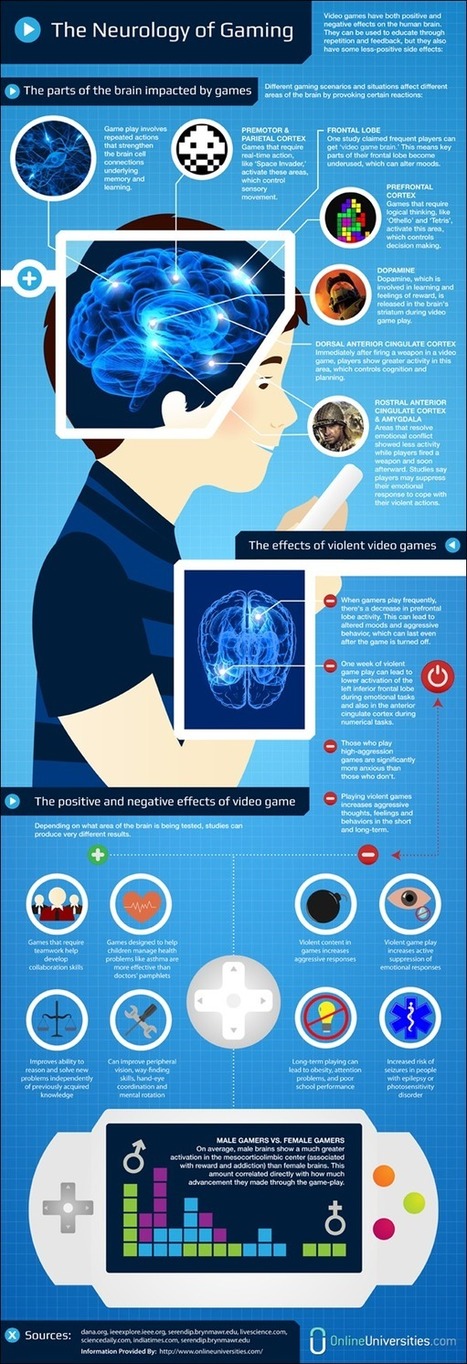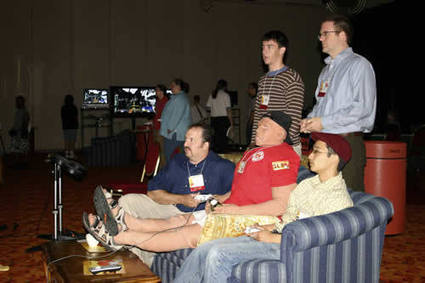 Your new post is loading...
 Your new post is loading...
The principles in this course did not originate in a computer lab but, rather, from the acute neurological and psychiatric care wards of large hospitals. Thus this course presents general principles of gamification that can be applied to the full range of the learning spectrum, ranging from people with severe disabilities through to post-graduate and professional development applications.

|
Scooped by
Judy Schrape
June 28, 2013 2:47 AM
|
If the investment in digital technology and gaming in schools is going to continue to grow, it is up to game developers and companies to do a better job sharing information about what games work and for what kind of learners. That was the message from the deputy director of the Bill and Melinda Gates Foundation who oversees investment in what the foundation dubs the next generation of K-12 education in the U.S. last week. Stacey Childress said the coming five years represented a real opportunity for digital content developers, but only if they change the way they currently operate.

|
Scooped by
Kim Flintoff
June 14, 2013 12:01 PM
|
The Secret to a Video-Game Phenomenon MIT Technology Review Among such gods, Markus Persson, the Swedish creator of Minecraft—a video game that has, in the four years since its initial release, become a 21st-century sensation, played in bedrooms...

|
Rescooped by
Kim Flintoff
from Game-Based Learning
June 12, 2013 10:44 PM
|
Keynote address from The Medical Device & Diagnostic Trainers Summit held in Princeton, NJ by the Socieyt of Pharmaceutical & Biotech Trainers...
Via JackieGerstein Ed.D.

|
Scooped by
Kim Flintoff
June 7, 2013 11:01 AM
|
HabitRPG is a time and task management tool which overlays motivational elements of computer games onto managing time and tasks.
The two major motivational elements are health points, which can be used up and coins which can be earned by doing daily tasks, following good habits and doing jobs from your 'Todos' list. These coins can then used to buy rewards.

|
Rescooped by
Peter Mellow
from The Mixing Panel
June 3, 2013 10:54 PM
|

|
Scooped by
Jacqui Kelly
May 26, 2013 9:18 PM
|

|
Scooped by
Kim Flintoff
May 24, 2013 12:26 AM
|
Kevin Werbach Gamification is the application of game elements and digital game design techniques to non-game problems, such as business and social impact challenges. This course will teach you the mechanisms of gamification, why it has such tremendous potential, and how to use it effectively.

|
Scooped by
Kim Flintoff
May 13, 2013 9:28 PM
|
Recently, gamification in education has been a trend characterized by two very different perspectives. Some see engagement, concentration and collaboration, while others see isolation, social dysfunction and addiction. This interactive, 3-hour session will dispel the myths surrounding gaming, draw clear connections between games and learning, and give attendees practical examples of this pedagogical approach happening right now in schools all over the world. A combination of experiential learning, presentations from gaming experts, and a special appearance by ISTE 2013 opening keynoter, Jane McGonigal, this session will explore gamification from a leadership perspective and will demonstrate how games can help us create rich, dynamic, and challenging learning environments.

|
Scooped by
Kim Flintoff
May 6, 2013 11:56 PM
|
OZU, a brand new university in Istanbul, asked us for a digital campaign to attract the top students from all around the country. We decided to let students test drive their own future. We designed a Facebook app that let them make their choices and see the consequences unfold first hand. This immersive experience was the first to use their actual facebook timeline to record the future, not just the past. We created “The Game of Your Life.”

|
Scooped by
Kim Flintoff
May 6, 2013 4:46 AM
|
Welcome to the Games and Simulation for Healthcare Library and Database. This website aims to provide a portal and network to meet the needs of clinicians, researchers and educators in the healthcare community who want to integrate games and simulation into their scholarship and patient care strategy. This resource also welcomes healthcare consumers, advocates, and others interested in patient and clinician education, and clinical research taking advantage of games and simulation-based learning.
Please visit frequently and feel free to contact our project team for details on how you can contribute to this project, or with any comments and suggestions.

|
Scooped by
Kim Flintoff
May 6, 2013 4:44 AM
|
Gamification Expert Yu-kai Chou explains his elegent Gamification Framework that breaks Human-Focused Design into 8 Core Drives within an Octagon.

|
Scooped by
Kim Flintoff
May 4, 2013 7:14 PM
|
Can games help tackle depression? Danny explores the link between video games and dealing with mental health issues. (@lucyjamesgames Just watched the great video on GS. Your so beautiful and smart and have a great career.
|

|
Scooped by
Kim Flintoff
June 30, 2013 9:29 PM
|
The Games-Based Learning MOOC is coming to an end (technically, at least, but I’m sure that many of us will continue to share ideas and resources since the MOOC is based upon the constructivism learning theory and uses Lisa Dawley’s Social Knowledge Network Construction method). The last week also happens to coincide with my preparations to present on my use of immersive role-play and Second Life in my Spring FYC II class at my university’s CoRE Summer Academy. The focus of my presentation will be on the benefits of using immersive role-play in the classroom and the results of my own experiment with doing so. Since some attendees may be unfamiliar with gamification and/or games-based learning, I have included a brief overview of some of the most basic principles of both. What I have discovered in trying to summarize the two is that they are extremely complex concepts; I am having great difficulty reducing either down to a single slide of bullet points. I keep finding myself wanting to summarize everything I’ve learned in the MOOC over the past six weeks and to defend both as important and viable pedagogical methodologies, especially as I consider how the term gamification has become almost a dirty word due to misuse and misappropriation of the term and the method. I know the kinds of reservations that educators have about buzzwords since I used to have the same reservations about gamification.

|
Scooped by
Kim Flintoff
June 19, 2013 6:57 PM
|
This online university set out to discover whether the use of gaming techniques could help students get beyond whatever obstructions were holding them back in one crucial gatekeeper course. The results were dramatic. The use of gaming techniques in higher education has been tested out aplenty in innovative environments such as MIT. But what about more traditional schools? Could the use of points, "missions," badges, and leaderboards really make a difference in more standard university environments, particularly one that was delivered entirely online? David DeHaven, dean of Kaplan University's School of Information Technology, set out in 2012 to examine how his school could exploit the fundamentals of gaming to enhance the experience of learning for its online students. He was monitoring the use of gaming theory or "gamification" in education to increase student engagement and motivation and thought it might have applicability to some of the challenges his own school was experiencing.

|
Scooped by
Kim Flintoff
June 13, 2013 6:28 PM
|
Can’t get your kids to stop playing video games? That may be a good thing, according to Duke University researchers. They find that hours spent at the console not only train players’ hands, they also may train the brain to make better and faster use of visual input, which is particularly the case for first-person shooters
Spotlight covers the intersections of technology and education, going behind the research to show how digital media is used in and out of classrooms to expand learning.
Via KevinHodgson

|
Scooped by
Kim Flintoff
June 6, 2013 7:31 AM
|
A game about creating games? Well that’s the wager that Greenheart Games took with its business simulationGame Dev Tycoon. A serious game giving you the chance to replay the history of video games from the 80’s until nowadays.

|
Scooped by
Kim Flintoff
May 28, 2013 9:16 AM
|
"This paper proposes an alternative concept for thinking about engagement in online environments as a form of “generative play”.

|
Scooped by
Kim Flintoff
May 25, 2013 9:47 PM
|
Most of gamers use to playing entertaining, funny, or not very engaging games. The aim of such games is pure relax and escape from everyday duties and efforts. But it doesn't work in all cases this way. Presently, we are seeing very fast growth of the mobile market with more and more variations of apps and games showing up to compete for interested customers. HTML5 gaming became one solution which can change the approach to game production. With the great advantage of cross platform features, HTML5 developer products can work on almost any platform we like. Any interactive standalone or mobile device with browser support can become a platform for HTML5 games. This potential can be used in many ways. Cross platform games can entertain, but they can also teach, help with experiments, or show new solutions to people of all ages. What I'm trying to prove here is that mobile gaming doesn't have to be only "a pig shooting contest", but it can also be a journey presenting a great experience for youngsters or allow exploration for the elderly who don't have as much experience as the younger generations.

|
Scooped by
Kim Flintoff
May 23, 2013 7:49 AM
|
There's nothing wrong with liking likes and other gamification forms (more on this in minute). What isn't great is when they become an obsession or a much bigger reason for playing in a social app or social site than your friends.

|
Scooped by
Kim Flintoff
May 7, 2013 7:21 AM
|
When the e-learning courses are dull, learners are bored and frustrated and hence learning does not happen and knowledge transfer does not take place...

|
Rescooped by
Kim Flintoff
from :: The 4th Era ::
May 6, 2013 7:24 PM
|
An impressive collection of 8 infographics that yield a great deal of positive information about the outcomes of video game utilization. Quite an eye-opener. -JL
Via Jim Lerman

|
Scooped by
Kim Flintoff
May 6, 2013 4:45 AM
|

|
Suggested by
Learning Futures
May 6, 2013 4:43 AM
|
Co-sponsored by GreaterThanGames and the PhD Lab in Digital Knowledge
Archived live-stream (also see selected tweets from the event at Storify) Approximately 90 minute discussion featuring scholars Pet Rorabaugh and Jesse Stommel (editors of the Journal Hybrid Pedagogy). Presentation begins at approximately 4:15 on the video.
---
Please join us for an event on MOOCs (Massi
|



 Your new post is loading...
Your new post is loading...







